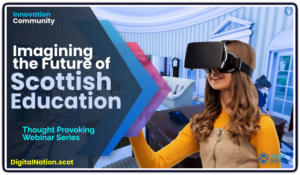 The goal of our Education innovation series is explore the long-term future of Scottish Education, starting with the issues they are dealing with today.
The goal of our Education innovation series is explore the long-term future of Scottish Education, starting with the issues they are dealing with today.
This Courier news article highlights what these issues are, most notably funding cuts.
Interviewing Simon Hewitt, principal of Dundee and Angus College, they write how he is tackling these challenges as the college faces a £2.6 million budget shortfall.
Despite year-on-year cuts, Hewitt emphasizes the college’s critical role in the local economy, with 96% of its students being local. He highlights the need for solutions to avoid further decline, learning from the financial crisis at nearby Dundee University.
The college has increased non-core income by 77% since 2021-22 but faced backlash for closing the Gardyne Sports Centre to prioritize student-focused spending. Hewitt, the youngest principal in Scotland, is determined to secure the college’s future, driven by his personal connection as a former student.
Innovation Program: Future of Scottish Digital Education
These challenges set the scene for our Digital Education innovation program, where we’ll examine the technology trends transforming this sector and what it means for our overall digital economy.
As Simon highlights our academic system is critical to our economic success. Indeed Dundee is a flagship example of this, where the local colleges and universities have catalyzed start-up businesses that have gone on to produce global scale giants across Gaming and Technology sectors.
Therefore the modernization of this sector is critical to our mission of building a world leading digital nation, with certain technologies key to this objective – Virtual Reality (VR) and the Metaverse are set to transform education by creating immersive, interactive learning environments. Students can explore historical events or complex scientific concepts in 3D, enhancing retention and engagement.
The Metaverse enables global collaboration, connecting learners across borders for shared projects. Personalized AI-driven experiences cater to individual needs, while VR simulations offer safe, cost-effective training for fields like medicine or engineering.
By integrating cutting-edge technologies and innovative pedagogies, our innovation program aims to ensure equitable access to education, reduce financial strain on institutions, and align training with Scotland’s economic needs.
Scottish EdTech Pioneers
An integral part of this exercise will be to showcase the Scottish entrepreneurs and innovators pioneering these technologies, offering a double benefit of improving our Education system while also growing local business ventures.
i-Immersive
i-immersive is a provider of large screen immersive classrooms for schools and colleges, who recently announced a partnership with Metaverse Learning, intended to tackle the teacher shortage problem by enabling colleges to connect campuses and share teaching resources, thereby expanding curriculum equity and accessibility.
They provide an ecosystem of unique immersive classrooms and Metaverse Learning offers a library of immersive learning programs available to license. They’re exploring innovative ways to integrate these simulations into teaching and learning, such as guiding learners through a healthcare simulation on a vast LED screen, inviting the group to suggest the best approach to a patient scenario.
Edify
Other exciting ventures includes Edify, founded by Scottish entrepreneurs with backgrounds in immersive content and technology Martin McDonnell and Chris Bryson. With Edify educators can create and share lessons and immersive learning content with students across desktop, mobile, and virtual reality. This means they can:
- Teach complex and abstract subjects more effectively and in more engaging ways.
- Work in virtual labs to conduct challenging or costly experiments safely and on repeat.
- Travel in time and experience historical sites as they were centuries ago.
- Level up the in-person learning experience, using virtual reality to go anywhere and do anything.



